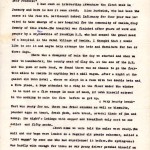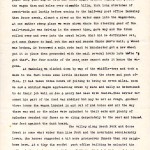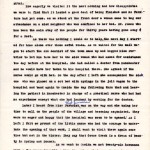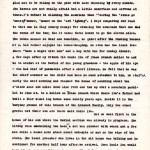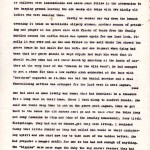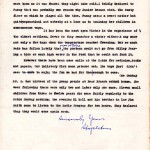Pine Mountain Settlement School
Series 09: Biography – Staff
Series 14: Medical, Health & Hygiene
Dr. Ida Stapleton and Rev. Robert Stapleton
Line Fork 1927 – 1947
STAPLETON REPORT – February 1932
“A JOURNEY IN JANUARY: — I had such an interesting adventure the first week in January and here is how it came about …”
GALLERY
TRANSCRIPTION: STAPLETON REPORT – February 1932 “A JOURNEY IN JANUARY: — I had such an interesting adventure …”
LINE FORK SETTLEMENT
Gilley P O Kentucky Feb 16 ‘32
A Journey in January
Dear Friends:-
I had such an interesting adventure the first week in January and here is how it came about. Miss [Marian] Purbrick, who had been the nurse at the Pine Mt Settlement School Infirmary for four years was invited to take charge of a new hospital for the community of Oneida, Clay County of this State. The hospital was finished after years of work and prayer by a Dr McConville of Brooklyn, N Y who had sensed the great need of a hospital in the rural village of Oneida. I thought that I would like to see it and maybe help arrange the beds and furniture for two or three days.
There was a downpour of rain the day we started and when we came to Manchester, the county seat of Clay Co at the end of the R R and the pike or made road, we found there was no chance to go the fourteen miles to Oneida in anything but a mail wagon. After a night at the quaint old Webb Hotel, where we slept in a room with two double beds and a fire place, a rope attached to a ring in the floor under the window to be used as a fire escape in case of need, Mr Webb himself entered in the morning to make the fire before we got up.
A very hearty breakfast was ready for us. There was fried chicken as well as biscuits, poached eggs on toast, fresh pork, corn bread, several kinds of jam and honey. The night’s lodgings with supper and breakfast only cost us one dollar and fifty cents.
About nine we were told the mules were ready. The mail and our bags were loaded in a regular old prairie schooner, called a “jolt wagon” by someone who had experienced it before. The spring-seat was hardly wide enough for three so our young driver perched himself on the edge of the wagon box. He was such a good looking boy but rather uncommunicative. At first he said that he didn’t know that the mules had any names and I heard him say occasionally in a commanding voice “Hy thar mule” and a little slap of the reins always brought a response from the mule. Later he forgot himself and mentioned Joe and Henry. I never had so much respect for mules before. In every difficult muddy place they just dug in with all their might without urging and pulled the wagon thru mud holes over sizeable hills, thru long stretches of creek-beds and lastly before coming to the half-way post office Tanksley thru Goose creek, almost a river as the water came into the wagon-box. At one rather steep place we were shown where the steering gear of the mail-truck, he was driving in the summer time, gave way and the truck rolled over and over into the creek below. What did he do? Climbed out, got some farmer to haul out the car and rescue Uncle Sam’s mail. A wheel was broken. He borrowed a mule, rode back to Manchester got a new wheel put it in place then proceeded with the mail several hours late but he “got thar”. For four months of the year, cars cannot make it hence the wagons.
At Tanksley, we climbed down by way of the whiffle-tree and took a walk to the farm house some little distance from the store and post office. It had taken three hours of jolting to bring us seven miles. Soon we saw a similar wagon approaching drawn by Kate and Sally as determined to do their job well as Joe & Henry had been with theirs. This driver reckoned his part of the road was muddier but maybe not as rough. Another three hours and the wagon lurched in and out of mud holes and all the way there was mud so the mules were splashed to their ears and plenty of splashes reached our faces as we clung desperately to the seat and braced our feet against the dash board.
The valley along Beech Fork and Goose Creek is somewhat wider than Line Fork and the mountains considerably lower. The houses suggested a bit more prosperous farmers than our neighbors here. At a tiny tin roofed post office building he unloaded the mail and then took us up to Melrose Hall the Girls’ Building of Oneida Community school started by “Burns of the mountains” thirty years ago. A Boys’ Hall and school building occupy the top of a mound made by Goose Creek and Red Bird Creek coming together in such a way they almost make an island of the village. The one large brick building in the center of a good sized plot of level ground surrounded by a wire fence is the Hospital.
How eagerly we visited it the next morning and how disappointed we were to find that it lacked a good deal of being finished and no furniture had come. As we stood at the front door a woman came to beg our attendance on a sick neighbor who was confined to her bed. Dr Jones who has been the main stay of the people for thirty years having gone away for a rest.
As there was nothing I could do to help, the next day I started for home alone over those awful roads. As we waited for the mail wagon to start the old dentist of the town came up and begged Miss Purbrick to let him take her to the sick woman who had asked for assistance the day before at the hospital. She had called a doctor from Manchester and he would have her taken to his hospital there. She agreed if the nurse would go with her. So the day after I left she accompanied the sick one who was placed on a cot bed with springs in the jolt wagon to the hospital and back again to Oneida the day following thru that mud leaving the patient in Manchester in charge of a practical nurse who had had no experience except what she had learned by working for the doctor.
Later I heard from Miss Purbrick that furniture was on the way and she using her time to call on the people of the village and becoming acquainted. They were so eager and happy that the hospital was soon to be opened. As I left I felt so proud of the little nurse who had the courage to undertake the opening of that work. I shall want to visit there again sometime but not in the Winter. They say that Goose Creek is a dream of beauty in Spring and Summer.
As we went to Oneida we met twenty-six horsemen with a few women travelling thru the mud on their way to Manchester. There were several wagons with four mules attached. They say they are used to the mud and haul freight whenever there is anything to haul except when the river rises above the road.
Back to Sandhill, the place where we cross Pine Mt, to get on to Line Fork. Mr S had brought Bess and was waiting for me so I left the bus here. It is a little better than a mile from Cumberland and I was glad not to be riding on the pike with cars whizzing by every minute. The horses are not really afraid but a little uncertain and nervous at times. I’d rather be climbing the mountain than “‘earing the ‘orses go ‘ammer,’ammer, ‘ammer on the ‘ard ‘ighway”. I kept comparing our road to that one in Clay County. Except for crossing the mountain that one was the worse of the two; tho it takes three hours to go the eleven miles. The Cabin seemed so dear and homelike, so quiet after the rushing busses.
Mr S had rather enjoyed his house-keeping. He even had the local teachers “take a night with him” and a boy with him for Sunday dinner. A few days after my return Old Uncle Ira of Trace Branch called to ask us to assist at the burial of his young grandson – the apple of his eye – who had died of pneumonia after a short illness. He felt that he was the chief mourner as the child had been so much attached to him. We started early the next morning and reached the house of mourning about ten o’clock some six miles down Line Fork and two up over a mountain parallel to Pine Mt to a hollow on Trace Branch where Uncle Ira’s father had built a fair sized log house some ninety years ago. Beside it is the burying ground of this branch of the Holcomb family. Only two other graves not their own are there said Uncle Ira.
But we went first to the house of his son where the burial service was already in progress. The living room containing two beds and a cot was crowded with women and a few men while a dozen more stood about out-side or sat on the edge of the stoop. The local preacher who lives in the old house was talking and he continued for another half hour after we arrived. Then Uncle Ira would have Mr S say something and we sang “Jewels”. I must then look at the little form to please Uncle Ira in the neat black coffin made by his Uncle Frank Hall. It was supported on a box between the two beds on which the people were sitting.
The box that had served as a table was still littered with bottles, cups, fruit and everything that had been used for the sick child. Fannie the mother and Robert the father with three older children were inconsolable and needs must follow in the procession to the burying ground leaving the six weeks old twins with two kindly old ladies who were nussing them.
Slowly we wended our way down the branch crossing it twice on unreliable slippery stones. Another season of preaching and prayer at the grave side with floods of tears from the family huddled around the coffin which was opened again for one last look. Finally it was over and as the men filled in the soil Uncle Ira showed the grave house he had built for his wife. Her one request when dying had been that her grave should be kept dry. He had kept his word that it should be. Two sons had met their death by shooting at the hands of another at the very door of the “Church in the wild wood”. He had managed to get a stone for them a low marble arch connected at the base with “Brothers” engraved on it. This was but the burial service and a real funeralizing service was arranged for the last week in next August.
Someone had sent me some lovely wax roses that had doubtless been a treasure for a long time in their home. These I took along to comfort Fannie. She said she would keep them to put on the grave next August. When we got back to the house the old nurses must go and we took over the twins Romy and Remy (cousins to Otis and Odus of the Bradley household). Poor little fledglings. They had had no chance, yet they were living. I reminded Fanny that little Junior as they had called him would be their ministering spirit and she must now try to take care of the babies better. She had prepared a meager outfit for one so two had not enough of anything. The “hippins” were mere rags tho Ruby the big sister reckoned they had as many as forty of them. Having some clothes on hand I had taken them with me and the mother was so pleased about that.
As we were so far from home we stayed while Fanny and Ruby got dinner which we ate with Uncle Ira, Robert with his brother in law Frank and son Earl while Fanny and Ruby nussed the babies. The floor hadn’t been scrubbed since the babies were born as it was feared they might take cold. I boldly declared to Fanny that was probably one reason why Junior became sick. The dusty floor on which he played all the time. Fanny seems a sweet mother but quite unpractical and utterly at loss as to training her children in commonsense ways.
It has been the most open Winter in the experience of the oldest settlers. Never do they remember a winter without any snow and only a few days when the temperature reached freezing. But so much rain has fallen lately that once or twice the postman could not go from Gilley fearing a tide or such high water in the Fork that he could not ford it.
However there had been some calls at the Cabin for medicine, books and papers. Our Tallstory Club soon petered out. The boys just didn’t seem to enjoy the fun we had for them enough to come.
One Sunday Mr S had sixteen of the young people at Bear Branch school house. The week following there were only two and later only one came. Eleven small children from three to twelve years old come fairly regularly to the Cabin Sunday morning. One evening Hi Hall and his brother in law Jim Smith came to listen to the Radio Program for two hours. They declared that they would come again soon.
Sincerely Yours
Stapletons
**Transcription by Gretchen Rasch.
Return to: GUIDE TO DR. IDA STAPLETON AND REV. ROBERT
STAPLETON REPORTS
See Also: DR. IDA STAPLETON & REV. ROBERT STAPLETON – Biography

